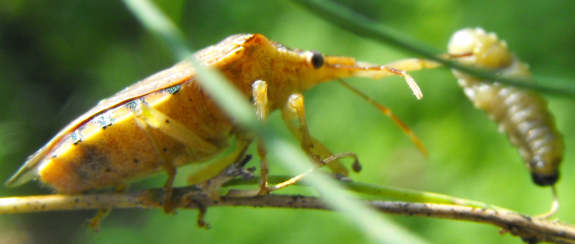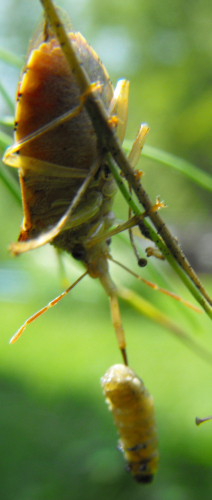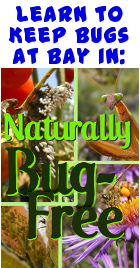
Predatory stink bug

 Stink
bugs are usually bad news in the garden. They suck the juices out
of your plants and the chickens won't even eat them because of the
Stink
bugs are usually bad news in the garden. They suck the juices out
of your plants and the chickens won't even eat them because of the
 noxious fluid they squirt out when disturbed. But if I'm honest,
my antipathy toward the insects dates from childhood. You see,
stink bugs love blackberries, and so do I. Pop a blackberry in
your mouth without looking and there's a good chance a stink bug might
come along for the ride, leaving the most awful taste in your mouth
imaginable.
noxious fluid they squirt out when disturbed. But if I'm honest,
my antipathy toward the insects dates from childhood. You see,
stink bugs love blackberries, and so do I. Pop a blackberry in
your mouth without looking and there's a good chance a stink bug might
come along for the ride, leaving the most awful taste in your mouth
imaginable.
Despite my scarred
childhood, stink bugs have now been redeemed in my eyes. I was
out on my weekly bug-picking expedition Monday, squashing asparagus
beetle larvae and
tossing all of the other bad bugs into a cup of water to give to the
chickens. Guess who was already helping with the asparagus beetle
control? This predatory stink bug uses its long proboscis to spear
insects and drain them dry rather than sucking a plant for lunch.
I'm glad I decided to
use manual control this year on our insects, even though it is a bit of
a pain to pick bugs for an hour a week during the growing season.
I've noticed spiders, ladybugs, and now this stink bug moving into the
asparagus, keeping the beetle populations in check. Maybe in a
few years, our beneficial insect populations will be so healthy that I
won't have to hand-squash larvae?
Want more in-depth information? Browse through our books.
Or explore more posts by date or by subject.
About us: Anna Hess and Mark Hamilton spent over a decade living self-sufficiently in the mountains of Virginia before moving north to start over from scratch in the foothills of Ohio. They've experimented with permaculture, no-till gardening, trailersteading, home-based microbusinesses and much more, writing about their adventures in both blogs and books.
Want to be notified when new comments are posted on this page? Click on the RSS button after you add a comment to subscribe to the comment feed, or simply check the box beside "email replies to me" while writing your comment.

I must say that I - sadly - know just what you mean about the horror of getting a stink bug along with whatever tasty bit you're eating (or in my case, drinking - stink bugs are the reason I now only drink water out of my stainless steel canteen with a sport top). Gagging on a stink bug is not fun, and not only does it make your mouth taste awful, but it makes everything you eat or drink taste awful too, for a bit anyway. Yep, not a fun experience.
I've always handpicked the bad bugs in our vegetable garden (though I throw mine to the fish in the pond); I'm not quite as good as you about doing it once every week, but even so it has seemed to work quite well enough. An organic CSA near us is experimenting this year with planting beneficial insect gardens - gardens with plants which supposedly attract the insects that want to help take care of the pests - and I'm following it closely to see how it works out for them. Have you ever considered including such plants in your garden? (Or perhaps you already are experimenting with it, and I missed that post, heh! )
)
We do try to plant nectary flowers to promote beneficials, although I don't use optimal techniques. It's best to mix the flowers in with the vegetables, but I tend to segregate the flowers into the forest garden in sub-prime growing area. I'd be curious to hear more about your CSA's techniques and their results.
Steer clear of those stink bugs!